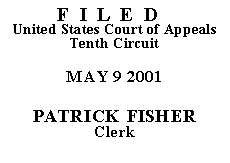

| UNITED STATES OF AMERICA,
Plaintiff-Appellee, Defendant-Appellant. |
No. 00-1418
(D.C. No. 00-M-1767) (D. Colo.) |
Mr. Rodriguez-Hernandez, a Mexican citizen, was convicted of the aggravated felony of "harrasment by stalking" in Colorado in 1996. That conviction led to his deportation through El Paso, Texas, on or about October 1, 1998. Mr. Rodriguez-Hernandez reentered the United States less than two months later and returned to Colorado, where he was arrested and indicted for violation of 8 U.S.C. § 1326(a), which prohibits removed aliens from reentering the United States without first obtaining express permission from the Attorney General. The government filed a Notice of Sentence Enhancement, proclaiming its intent to seek an enhanced penalty under 8 U.S.C. § 1326(b)(2), which mandates sentences of up to twenty years for individuals convicted of violating section 1326 after an aggravated felony conviction. Mr. Rodriguez-Hernandez pleaded guilty to the illegal reentry charge, stipulating to underlying facts which included his earlier aggravated felony conviction and subsequent deportation. His presentence report suggested a guideline range of 77-96 months, but the district court granted his motion for a departure from the guidelines and sentenced him to 60 months in prison.
After this court dismissed a direct appeal in March 2000, Mr. Rodriguez-Hernandez filed a 28 U.S.C. § 2255 petition for habeas corpus in the district court. He argued he was denied due process because his indictment had not included the aggravated felony sentencing enhancement as an element of the indicted offense. He also claimed ineffective assistance of counsel, and challenged the calculation of his sentence. The district court concluded there was no ineffective assistance of counsel, no sentencing challenge was warranted, and the enhanced sentence was proper because Mr. Rodriguez-Hernandez had stipulated to the prior aggravated felony conviction. Mr. Rodriguez-Hernandez moved for a COA in the district court, which denied the motion. He then filed this appeal and related application for a COA.
Under 28 U.S.C. § 2253(b)(2), we may grant a COA and hear this appeal only if we find that Mr. Rodriguez-Hernandez "has made a substantial showing of the denial of a constitutional right." Relying upon Apprendi v. New Jersey, 530 U.S. 435 (2000), he argues his constitutional rights were violated when a sentence-enhancing fact was excluded from his indictment. Apprendi held that, "[o]ther than the fact of a prior conviction, any fact that increases the penalty for a crime beyond the prescribed statutory maximum must be submitted to a jury, and proved beyond a reasonable doubt." Id. at 490. Although this rule makes no mention of indictment practices, other language in Apprendi suggested the relevant facts must be included in an indictment as well. See id. at 476. We so held in United States v. Jones, 235 F.3d 1231, 1236 (10th Cir. 2000). Because the rule set forth in Apprendi is rooted in the jury trial and due process guarantees of the Sixth and Fourteenth Amendments, an Apprendi violation would fit the definition of a "denial of a constitutional right." See Browning v. United States, No. 00-7096, 2001 WL 202041 (10th Cir. Mar. 1, 2001) (en banc) (Apprendi a new rule of constitutional law).
Mr. Rodriguez-Hernandez contends that, because his five-year sentence for violation of section 1326 after an aggravated felony conviction exceeds the two-year maximum penalty for someone without a previous conviction, Apprendi requires that the fact of the prior conviction be included in an indictment. This argument overlooks the explicit language of Apprendi, which limited its application to facts "[o]ther than a prior conviction." 530 U.S. at 490 (emphasis added). Prior felony convictions remain a valid basis for sentencing enhancements. See Almendarez-Torres v. United States, 523 U.S. 224 (1998). Although Mr. Rodriguez-Hernandez argues certain language in Apprendi foreshadowed that Almendarez-Torres will be overruled, Almendarez-Torres remains controlling law at present. Under the holding of that case as well as Apprendi's clear exception for prior convictions, the government committed no constitutional error in using Mr. Rodriguez-Hernandez's prior conviction as a sentence enhancing element without first including it in the indictment. See United States v. Dorris, 236 F.3d 582, 587-88 (10th Cir. 2000).
Mr. Rodriguez-Hernandez also claims the ineffective assistance of counsel during sentencing proceedings, but he offers no facts to support this bare assertion. While it is well settled that courts must construe pro se pleadings broadly, see Haines v. Kerner, 404 U.S. 519, 520-21 (1972) (per curiam), we will not attempt to create an argument for the plaintiff in the absence of any discussion of the issues, see Drake v. City of Fort Collins, 927 F.2d 1156, 1159 (10th Cir. 1991). We further note the district court's observation that its departure from the sentencing guidelines to reduce Mr. Rodriguez-Hernandez's sentence was proof that his counsel was, in fact, effective.
Because Mr. Rodriguez-Hernandez has made no showing of any denial of his constitutional rights, we DENY his request for a COA and DISMISS the appeal.
ENTERED FOR THE COURT
Stephanie K. Seymour
Circuit Judge
*.After examining appellant's brief and the appellate record, this panel has determined unanimously that oral argument would not materially assist the determination of this appeal. See Fed. R. App. P. 34(a)(2) and 10th Cir. R. 34.1(G). The case is therefore submitted without oral argument. This order and judgment is not binding precedent, except under the doctrines of law of the case, res judicata, or collateral estoppel. The court generally disfavors the citation of orders and judgments; nevertheless, an order and judgment may be cited under the terms and conditions of 10th Cir. R. 36.3.